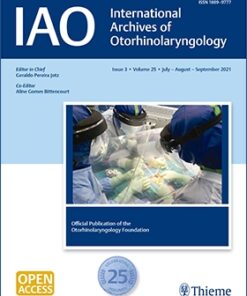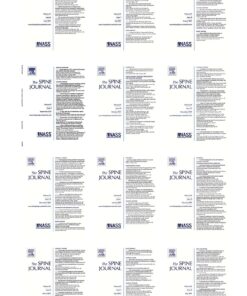How to Find Quality Journals and Articles for Your Research
Start Writing Your Own Journals and Articles Now!
Are you looking for a platform to write your own journals and articles? Look no further! SurgeryBook.net is the perfect place for you to start. With our easy-to-use interface, you can quickly create and publish your own content in no time. We provide a wide range of features that will help you make your writing stand out from the rest. You can also collaborate with other authors and share your work with the world. So what are you waiting for? Start writing your own journals and articles now at SurgeryBook.net!
JOURNALS/ARTICLES
Discover the Best General Surgery Books: A Comprehensive Guide
HEAD AND NECK SURGERY & OTOLARYNGOLOGY
HEAD AND NECK SURGERY & OTOLARYNGOLOGY
HEAD AND NECK SURGERY & OTOLARYNGOLOGY
JOURNALS/ARTICLES
JOURNALS/ARTICLES
JOURNALS/ARTICLES
JOURNALS/ARTICLES
Introduction
Are you looking for quality journals and articles to use in your research? Finding reliable sources of information is essential for any successful research project. This guide will provide you with tips on how to find quality journals and articles that are relevant to your research topic. We’ll discuss the importance of using credible sources, how to evaluate the credibility of a journal or article, and where to look for quality journals and articles. With these tips, you’ll be able to find the best sources for your research.
Utilizing Library Databases to Find Quality Journals and Articles
Utilizing library databases to find quality journals and articles is an essential part of the research process. Library databases are collections of scholarly materials, such as journal articles, books, and other sources, that have been carefully selected by librarians for their relevance and accuracy. These databases provide access to a wealth of information that can be used to support research projects, papers, and other academic endeavors.
When searching for quality journals and articles, it is important to use library databases rather than general search engines like Google or Bing. General search engines often return results that are not relevant to the topic being researched, while library databases are specifically designed to provide accurate and reliable information. Additionally, library databases often contain full-text versions of articles, which can be accessed without having to purchase them.
When using library databases, it is important to understand how to effectively search for the information you need. Start by entering keywords related to your topic into the search bar. You may also want to narrow your search by selecting specific fields, such as author, title, or subject. This will help you find more relevant results. Once you have identified some potential sources, you can read the abstracts to determine if they are appropriate for your project.
It is also important to evaluate the quality of the sources you find in library databases. Look for sources that have been published in reputable journals or from well-known authors. Additionally, look for sources that have been cited by other researchers, as this indicates that the source is reliable and has been accepted by the academic community.
Finally, remember to cite any sources you use in your research. Citing sources is an important part of academic integrity and helps to ensure that your work is properly attributed. Most library databases provide citation information for each article, making it easy to include citations in your paper.
Utilizing library databases to find quality journals and articles is an essential part of the research process. By understanding how to effectively search for and evaluate sources, you can ensure that your research is based on reliable and accurate information.
Evaluating the Credibility of Sources for Research
When conducting research, it is important to evaluate the credibility of sources. This means determining whether a source is reliable and trustworthy. Evaluating the credibility of sources helps ensure that the information used in research is accurate and valid.
There are several factors to consider when evaluating the credibility of sources. The first is the author’s credentials. It is important to determine if the author is an expert in the field or has any relevant qualifications. Additionally, it is important to consider the publisher of the source. Reputable publishers are more likely to produce reliable sources than unknown or lesser-known publishers.
The date of publication is also important when evaluating the credibility of sources. Outdated sources may not be as reliable as more recent sources. It is important to make sure that the source is up-to-date and relevant to the topic being researched.
It is also important to consider the purpose of the source. Is the source intended to inform, persuade, or entertain? Sources that are intended to inform are more likely to be reliable than those that are intended to persuade or entertain. Additionally, it is important to consider the bias of the source. Sources with a clear bias should be used with caution.
Finally, it is important to consider the accuracy of the source. Are there any errors or inconsistencies in the source? If so, the source may not be reliable. Additionally, it is important to consider the source’s reputation. Are other researchers citing the source? If so, it is likely to be reliable.
Evaluating the credibility of sources is an important part of the research process. By considering the author’s credentials, the publisher, the date of publication, the purpose of the source, the bias, and the accuracy, researchers can ensure that the sources they use are reliable and trustworthy.
Understanding the Different Types of Journals and Articles
When it comes to researching and writing academic papers, understanding the different types of journals and articles is essential. Journals and articles are two of the most common sources of information used in research, and they can be found in both print and online formats. Knowing the differences between these two types of publications can help you determine which one is best suited for your research needs.
Journals are scholarly publications that contain original research and analysis on a particular topic. They are typically published by universities or other academic institutions and are peer-reviewed, meaning that experts in the field review the content before it is published. Journals are usually published on a regular basis, such as monthly or quarterly, and often include a variety of topics related to the journal’s focus.
Articles, on the other hand, are shorter pieces of writing that are typically published in magazines, newspapers, or other periodicals. Unlike journals, articles are not peer-reviewed and may not contain original research. Instead, they are written to provide an overview of a particular topic or to discuss current events. Articles are usually written in a more informal style than journals and are intended to be read by a general audience.
When selecting a source for your research, it is important to consider the type of publication you are using. Journals are ideal for in-depth research on a specific topic, while articles are better suited for providing an overview of a topic or discussing current events. Additionally, it is important to note that some journals and articles may be available in both print and online formats, so it is important to check both when conducting research.
Overall, understanding the different types of journals and articles is essential for any researcher. Knowing the differences between these two types of publications can help you select the best source for your research needs.
Using Advanced Search Techniques to Locate Relevant Research
Advanced search techniques are an invaluable tool for locating relevant research. By utilizing these techniques, researchers can quickly and easily find the information they need to support their work.
Advanced search techniques involve using a variety of search terms and filters to narrow down the results of a search query. For example, when searching for research on a particular topic, one might use keywords related to the topic, as well as specific phrases or authors associated with the topic. Additionally, advanced search techniques often involve using Boolean operators such as “AND”, “OR”, and “NOT” to refine the search results.
Another important aspect of advanced search techniques is the ability to limit the results by date range, language, publication type, and other criteria. This allows researchers to focus on the most recent and relevant research available. Additionally, many databases offer the option to save searches, which can be useful for tracking new publications in a particular field.
Finally, advanced search techniques can also be used to locate research from specific sources. For example, if a researcher is looking for research published in a particular journal, they can use the journal name as a search term to limit the results to only those articles published in that journal.
Using advanced search techniques can help researchers quickly and easily locate the most relevant research available. By taking advantage of these techniques, researchers can save time and effort while ensuring that their research is based on the most up-to-date and accurate information.
Identifying Scholarly Journals and Articles for Your Research
Identifying scholarly journals and articles for your research is an important step in the research process. It can be difficult to determine which sources are reliable and which ones are not, but it is essential to ensure that you are using credible information in your work.
When looking for scholarly journals and articles, it is important to consider the source of the material. Scholarly journals are typically published by academic institutions or professional organizations, and they often contain peer-reviewed research. Peer-reviewed research is a type of research that has been reviewed by experts in the field before being published. This ensures that the research is accurate and reliable.
In addition to considering the source of the material, it is also important to look at the content of the journal or article. Scholarly journals and articles should include detailed information about the research methods used, as well as the results of the research. They should also include citations to other sources that support the findings.
It is also important to consider the author of the journal or article. The author should have credentials in the field and should be an expert on the topic. If the author does not have any credentials, it is best to avoid the source.
Finally, it is important to consider the date of publication. Scholarly journals and articles should be up-to-date and relevant to the topic. If the material is outdated, it may not be reliable.
By taking the time to identify scholarly journals and articles for your research, you can ensure that you are using reliable and accurate information in your work. This will help to ensure that your research is credible and trustworthy.
Conclusion
In conclusion, finding quality journals and articles for your research can be a daunting task. However, by following the steps outlined in this article, you can easily identify reliable sources of information. Start by using reputable databases to search for relevant topics, then use the criteria provided to evaluate the quality of the journal or article. Finally, make sure to cite any sources used in your research paper. By taking these steps, you can ensure that your research is based on reliable and accurate information.








